Case Study Analysis: Lisa's Mental Health, Trauma, and Recovery
VerifiedAdded on 2023/01/20
|11
|2950
|50
Case Study
AI Summary
This case study analyzes Lisa's mental health issues through a trauma-informed care lens, focusing on her experiences with auditory hallucinations, lack of family support, and substance abuse. The paper identifies these issues and discusses their impact, referencing relevant literature and applying the principles of trauma-informed care and practice (TICP). It outlines how mental health nurses can collaborate with Lisa to achieve her personal recovery, emphasizing person-centered care, self-management strategies, and safety planning. The study highlights the importance of involving family members and other mental health professionals, such as counselors, in a collaborative approach. The conclusion reinforces the value of a trauma-centered approach in supporting patient recovery, emphasizing policy and practice adjustments to overcome barriers and promote well-being, with a focus on collaborative practice between mental health nurses and counselors.

Running head: CASE STUDY OF LISA
Name of the Student
Name of the University
Author Note
Name of the Student
Name of the University
Author Note
Paraphrase This Document
Need a fresh take? Get an instant paraphrase of this document with our AI Paraphraser
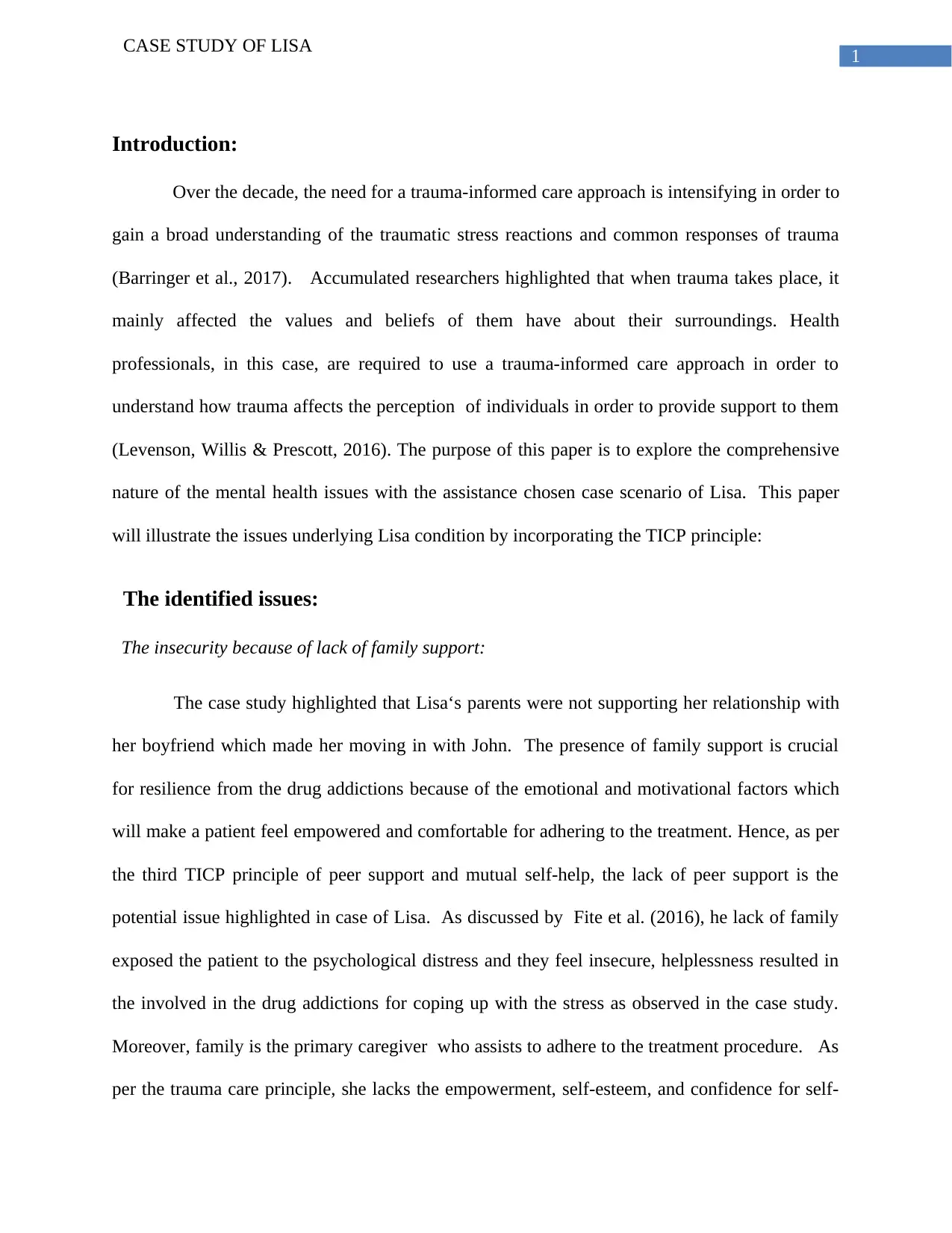
1
CASE STUDY OF LISA
Introduction:
Over the decade, the need for a trauma-informed care approach is intensifying in order to
gain a broad understanding of the traumatic stress reactions and common responses of trauma
(Barringer et al., 2017). Accumulated researchers highlighted that when trauma takes place, it
mainly affected the values and beliefs of them have about their surroundings. Health
professionals, in this case, are required to use a trauma-informed care approach in order to
understand how trauma affects the perception of individuals in order to provide support to them
(Levenson, Willis & Prescott, 2016). The purpose of this paper is to explore the comprehensive
nature of the mental health issues with the assistance chosen case scenario of Lisa. This paper
will illustrate the issues underlying Lisa condition by incorporating the TICP principle:
The identified issues:
The insecurity because of lack of family support:
The case study highlighted that Lisa‘s parents were not supporting her relationship with
her boyfriend which made her moving in with John. The presence of family support is crucial
for resilience from the drug addictions because of the emotional and motivational factors which
will make a patient feel empowered and comfortable for adhering to the treatment. Hence, as per
the third TICP principle of peer support and mutual self-help, the lack of peer support is the
potential issue highlighted in case of Lisa. As discussed by Fite et al. (2016), he lack of family
exposed the patient to the psychological distress and they feel insecure, helplessness resulted in
the involved in the drug addictions for coping up with the stress as observed in the case study.
Moreover, family is the primary caregiver who assists to adhere to the treatment procedure. As
per the trauma care principle, she lacks the empowerment, self-esteem, and confidence for self-
CASE STUDY OF LISA
Introduction:
Over the decade, the need for a trauma-informed care approach is intensifying in order to
gain a broad understanding of the traumatic stress reactions and common responses of trauma
(Barringer et al., 2017). Accumulated researchers highlighted that when trauma takes place, it
mainly affected the values and beliefs of them have about their surroundings. Health
professionals, in this case, are required to use a trauma-informed care approach in order to
understand how trauma affects the perception of individuals in order to provide support to them
(Levenson, Willis & Prescott, 2016). The purpose of this paper is to explore the comprehensive
nature of the mental health issues with the assistance chosen case scenario of Lisa. This paper
will illustrate the issues underlying Lisa condition by incorporating the TICP principle:
The identified issues:
The insecurity because of lack of family support:
The case study highlighted that Lisa‘s parents were not supporting her relationship with
her boyfriend which made her moving in with John. The presence of family support is crucial
for resilience from the drug addictions because of the emotional and motivational factors which
will make a patient feel empowered and comfortable for adhering to the treatment. Hence, as per
the third TICP principle of peer support and mutual self-help, the lack of peer support is the
potential issue highlighted in case of Lisa. As discussed by Fite et al. (2016), he lack of family
exposed the patient to the psychological distress and they feel insecure, helplessness resulted in
the involved in the drug addictions for coping up with the stress as observed in the case study.
Moreover, family is the primary caregiver who assists to adhere to the treatment procedure. As
per the trauma care principle, she lacks the empowerment, self-esteem, and confidence for self-
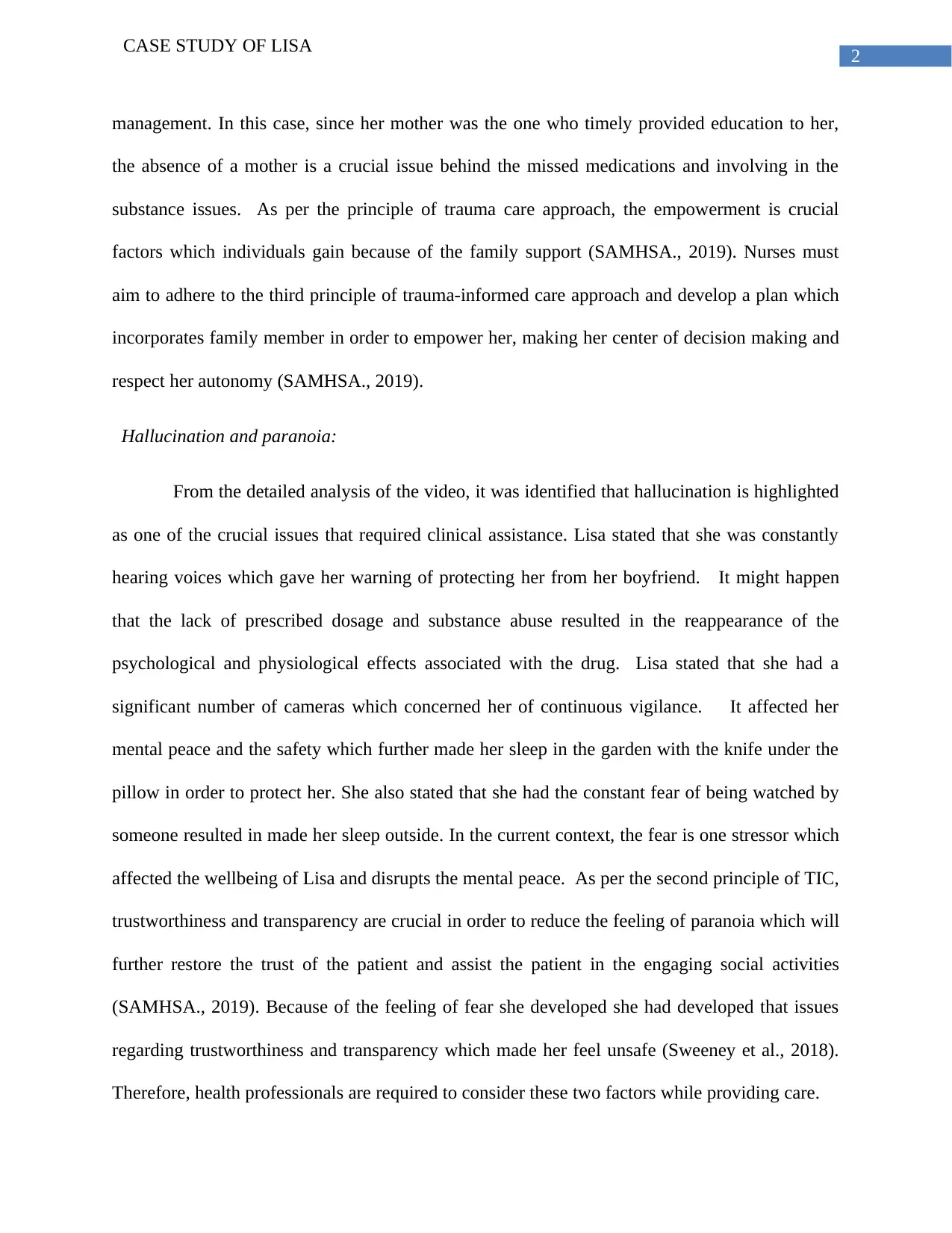
2
CASE STUDY OF LISA
management. In this case, since her mother was the one who timely provided education to her,
the absence of a mother is a crucial issue behind the missed medications and involving in the
substance issues. As per the principle of trauma care approach, the empowerment is crucial
factors which individuals gain because of the family support (SAMHSA., 2019). Nurses must
aim to adhere to the third principle of trauma-informed care approach and develop a plan which
incorporates family member in order to empower her, making her center of decision making and
respect her autonomy (SAMHSA., 2019).
Hallucination and paranoia:
From the detailed analysis of the video, it was identified that hallucination is highlighted
as one of the crucial issues that required clinical assistance. Lisa stated that she was constantly
hearing voices which gave her warning of protecting her from her boyfriend. It might happen
that the lack of prescribed dosage and substance abuse resulted in the reappearance of the
psychological and physiological effects associated with the drug. Lisa stated that she had a
significant number of cameras which concerned her of continuous vigilance. It affected her
mental peace and the safety which further made her sleep in the garden with the knife under the
pillow in order to protect her. She also stated that she had the constant fear of being watched by
someone resulted in made her sleep outside. In the current context, the fear is one stressor which
affected the wellbeing of Lisa and disrupts the mental peace. As per the second principle of TIC,
trustworthiness and transparency are crucial in order to reduce the feeling of paranoia which will
further restore the trust of the patient and assist the patient in the engaging social activities
(SAMHSA., 2019). Because of the feeling of fear she developed she had developed that issues
regarding trustworthiness and transparency which made her feel unsafe (Sweeney et al., 2018).
Therefore, health professionals are required to consider these two factors while providing care.
CASE STUDY OF LISA
management. In this case, since her mother was the one who timely provided education to her,
the absence of a mother is a crucial issue behind the missed medications and involving in the
substance issues. As per the principle of trauma care approach, the empowerment is crucial
factors which individuals gain because of the family support (SAMHSA., 2019). Nurses must
aim to adhere to the third principle of trauma-informed care approach and develop a plan which
incorporates family member in order to empower her, making her center of decision making and
respect her autonomy (SAMHSA., 2019).
Hallucination and paranoia:
From the detailed analysis of the video, it was identified that hallucination is highlighted
as one of the crucial issues that required clinical assistance. Lisa stated that she was constantly
hearing voices which gave her warning of protecting her from her boyfriend. It might happen
that the lack of prescribed dosage and substance abuse resulted in the reappearance of the
psychological and physiological effects associated with the drug. Lisa stated that she had a
significant number of cameras which concerned her of continuous vigilance. It affected her
mental peace and the safety which further made her sleep in the garden with the knife under the
pillow in order to protect her. She also stated that she had the constant fear of being watched by
someone resulted in made her sleep outside. In the current context, the fear is one stressor which
affected the wellbeing of Lisa and disrupts the mental peace. As per the second principle of TIC,
trustworthiness and transparency are crucial in order to reduce the feeling of paranoia which will
further restore the trust of the patient and assist the patient in the engaging social activities
(SAMHSA., 2019). Because of the feeling of fear she developed she had developed that issues
regarding trustworthiness and transparency which made her feel unsafe (Sweeney et al., 2018).
Therefore, health professionals are required to consider these two factors while providing care.
⊘ This is a preview!⊘
Do you want full access?
Subscribe today to unlock all pages.

Trusted by 1+ million students worldwide
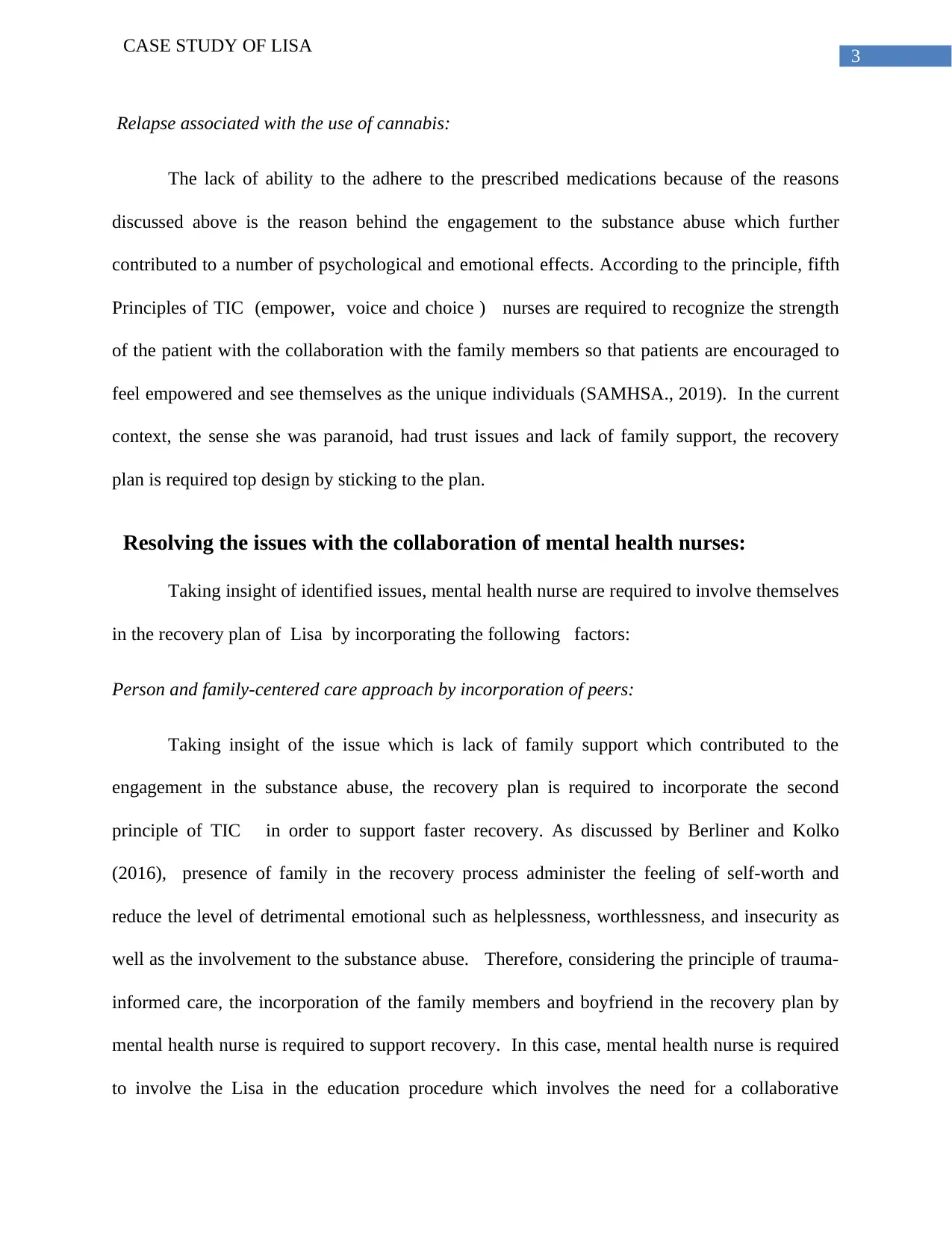
3
CASE STUDY OF LISA
Relapse associated with the use of cannabis:
The lack of ability to the adhere to the prescribed medications because of the reasons
discussed above is the reason behind the engagement to the substance abuse which further
contributed to a number of psychological and emotional effects. According to the principle, fifth
Principles of TIC (empower, voice and choice ) nurses are required to recognize the strength
of the patient with the collaboration with the family members so that patients are encouraged to
feel empowered and see themselves as the unique individuals (SAMHSA., 2019). In the current
context, the sense she was paranoid, had trust issues and lack of family support, the recovery
plan is required top design by sticking to the plan.
Resolving the issues with the collaboration of mental health nurses:
Taking insight of identified issues, mental health nurse are required to involve themselves
in the recovery plan of Lisa by incorporating the following factors:
Person and family-centered care approach by incorporation of peers:
Taking insight of the issue which is lack of family support which contributed to the
engagement in the substance abuse, the recovery plan is required to incorporate the second
principle of TIC in order to support faster recovery. As discussed by Berliner and Kolko
(2016), presence of family in the recovery process administer the feeling of self-worth and
reduce the level of detrimental emotional such as helplessness, worthlessness, and insecurity as
well as the involvement to the substance abuse. Therefore, considering the principle of trauma-
informed care, the incorporation of the family members and boyfriend in the recovery plan by
mental health nurse is required to support recovery. In this case, mental health nurse is required
to involve the Lisa in the education procedure which involves the need for a collaborative
CASE STUDY OF LISA
Relapse associated with the use of cannabis:
The lack of ability to the adhere to the prescribed medications because of the reasons
discussed above is the reason behind the engagement to the substance abuse which further
contributed to a number of psychological and emotional effects. According to the principle, fifth
Principles of TIC (empower, voice and choice ) nurses are required to recognize the strength
of the patient with the collaboration with the family members so that patients are encouraged to
feel empowered and see themselves as the unique individuals (SAMHSA., 2019). In the current
context, the sense she was paranoid, had trust issues and lack of family support, the recovery
plan is required top design by sticking to the plan.
Resolving the issues with the collaboration of mental health nurses:
Taking insight of identified issues, mental health nurse are required to involve themselves
in the recovery plan of Lisa by incorporating the following factors:
Person and family-centered care approach by incorporation of peers:
Taking insight of the issue which is lack of family support which contributed to the
engagement in the substance abuse, the recovery plan is required to incorporate the second
principle of TIC in order to support faster recovery. As discussed by Berliner and Kolko
(2016), presence of family in the recovery process administer the feeling of self-worth and
reduce the level of detrimental emotional such as helplessness, worthlessness, and insecurity as
well as the involvement to the substance abuse. Therefore, considering the principle of trauma-
informed care, the incorporation of the family members and boyfriend in the recovery plan by
mental health nurse is required to support recovery. In this case, mental health nurse is required
to involve the Lisa in the education procedure which involves the need for a collaborative
Paraphrase This Document
Need a fresh take? Get an instant paraphrase of this document with our AI Paraphraser
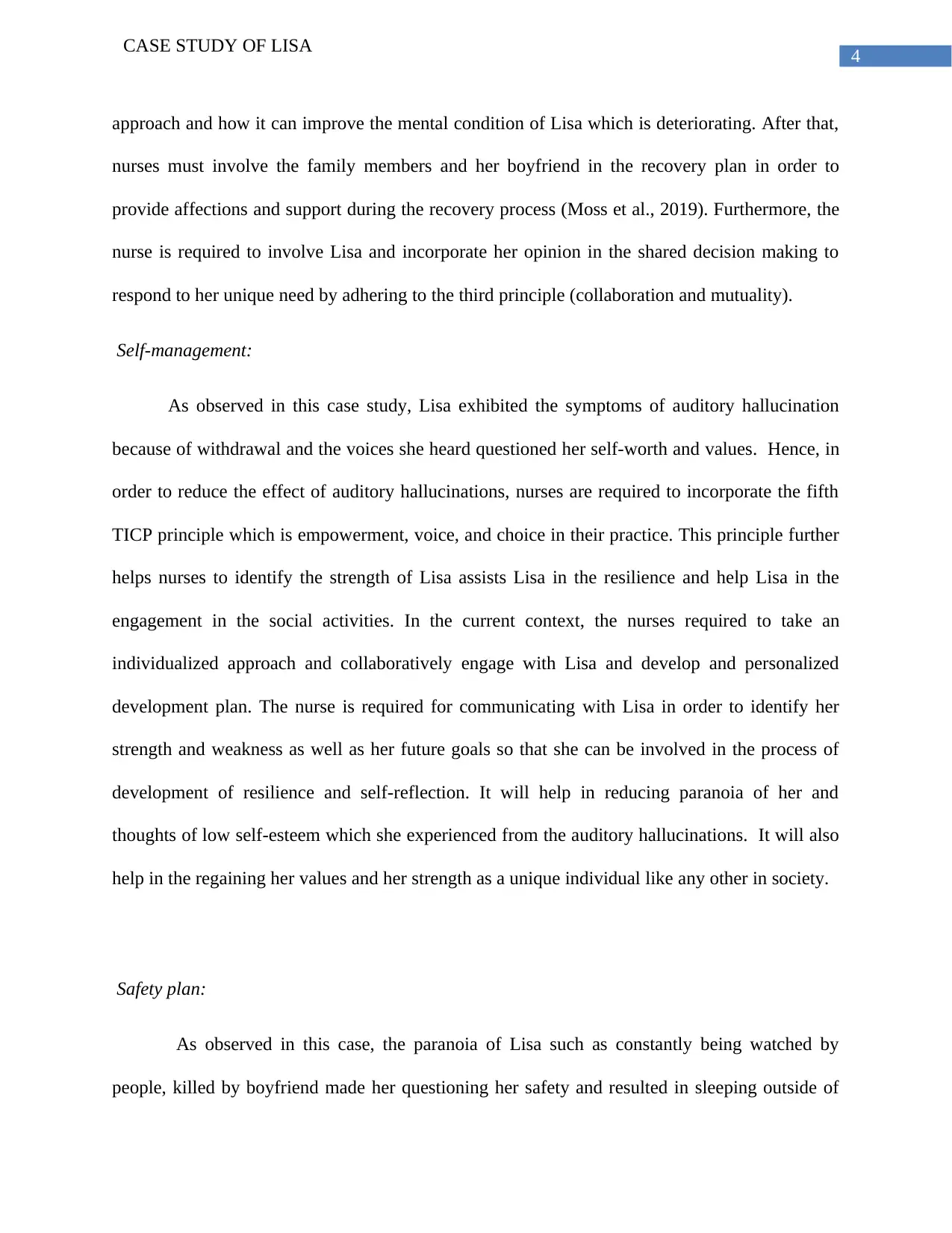
4
CASE STUDY OF LISA
approach and how it can improve the mental condition of Lisa which is deteriorating. After that,
nurses must involve the family members and her boyfriend in the recovery plan in order to
provide affections and support during the recovery process (Moss et al., 2019). Furthermore, the
nurse is required to involve Lisa and incorporate her opinion in the shared decision making to
respond to her unique need by adhering to the third principle (collaboration and mutuality).
Self-management:
As observed in this case study, Lisa exhibited the symptoms of auditory hallucination
because of withdrawal and the voices she heard questioned her self-worth and values. Hence, in
order to reduce the effect of auditory hallucinations, nurses are required to incorporate the fifth
TICP principle which is empowerment, voice, and choice in their practice. This principle further
helps nurses to identify the strength of Lisa assists Lisa in the resilience and help Lisa in the
engagement in the social activities. In the current context, the nurses required to take an
individualized approach and collaboratively engage with Lisa and develop and personalized
development plan. The nurse is required for communicating with Lisa in order to identify her
strength and weakness as well as her future goals so that she can be involved in the process of
development of resilience and self-reflection. It will help in reducing paranoia of her and
thoughts of low self-esteem which she experienced from the auditory hallucinations. It will also
help in the regaining her values and her strength as a unique individual like any other in society.
Safety plan:
As observed in this case, the paranoia of Lisa such as constantly being watched by
people, killed by boyfriend made her questioning her safety and resulted in sleeping outside of
CASE STUDY OF LISA
approach and how it can improve the mental condition of Lisa which is deteriorating. After that,
nurses must involve the family members and her boyfriend in the recovery plan in order to
provide affections and support during the recovery process (Moss et al., 2019). Furthermore, the
nurse is required to involve Lisa and incorporate her opinion in the shared decision making to
respond to her unique need by adhering to the third principle (collaboration and mutuality).
Self-management:
As observed in this case study, Lisa exhibited the symptoms of auditory hallucination
because of withdrawal and the voices she heard questioned her self-worth and values. Hence, in
order to reduce the effect of auditory hallucinations, nurses are required to incorporate the fifth
TICP principle which is empowerment, voice, and choice in their practice. This principle further
helps nurses to identify the strength of Lisa assists Lisa in the resilience and help Lisa in the
engagement in the social activities. In the current context, the nurses required to take an
individualized approach and collaboratively engage with Lisa and develop and personalized
development plan. The nurse is required for communicating with Lisa in order to identify her
strength and weakness as well as her future goals so that she can be involved in the process of
development of resilience and self-reflection. It will help in reducing paranoia of her and
thoughts of low self-esteem which she experienced from the auditory hallucinations. It will also
help in the regaining her values and her strength as a unique individual like any other in society.
Safety plan:
As observed in this case, the paranoia of Lisa such as constantly being watched by
people, killed by boyfriend made her questioning her safety and resulted in sleeping outside of
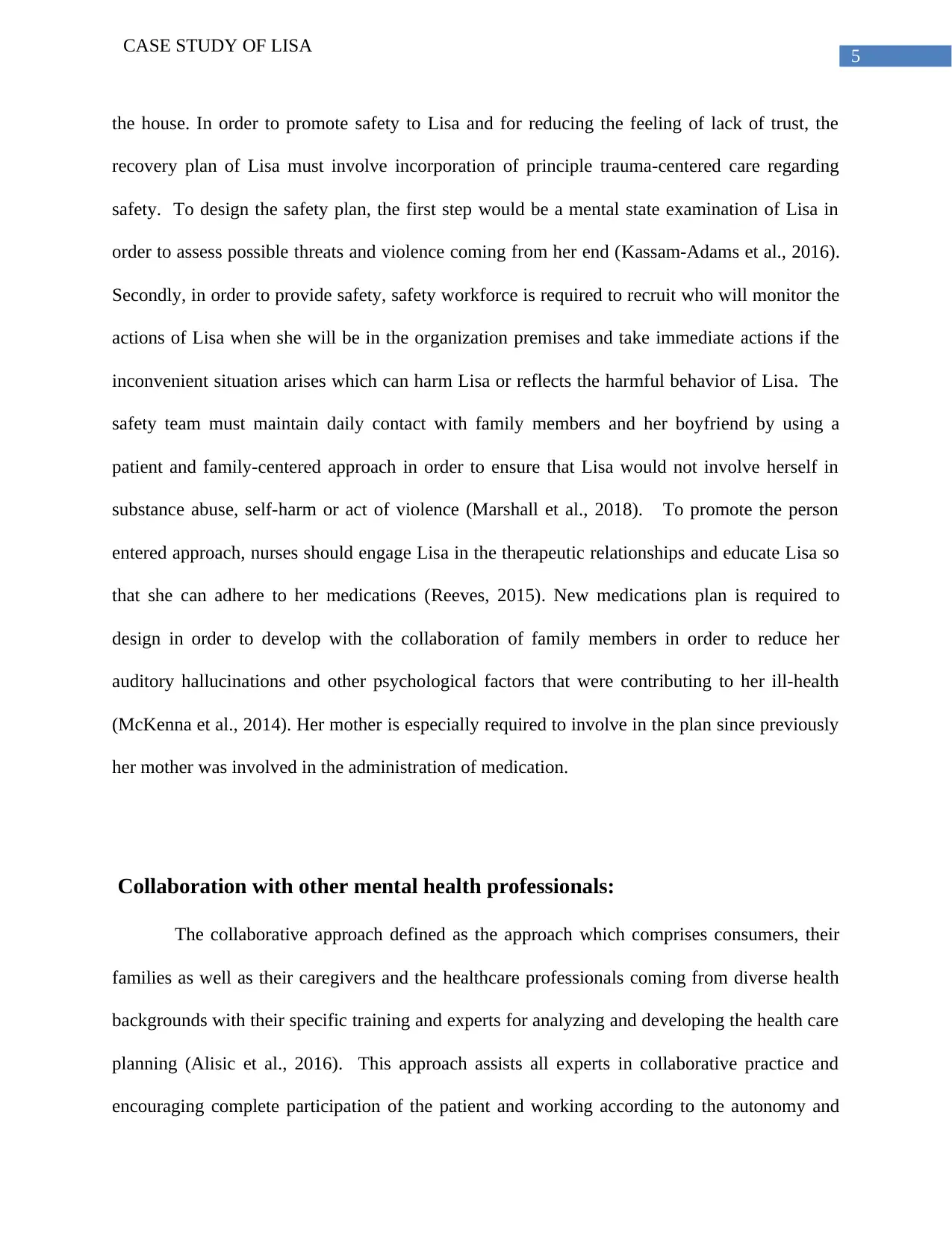
5
CASE STUDY OF LISA
the house. In order to promote safety to Lisa and for reducing the feeling of lack of trust, the
recovery plan of Lisa must involve incorporation of principle trauma-centered care regarding
safety. To design the safety plan, the first step would be a mental state examination of Lisa in
order to assess possible threats and violence coming from her end (Kassam-Adams et al., 2016).
Secondly, in order to provide safety, safety workforce is required to recruit who will monitor the
actions of Lisa when she will be in the organization premises and take immediate actions if the
inconvenient situation arises which can harm Lisa or reflects the harmful behavior of Lisa. The
safety team must maintain daily contact with family members and her boyfriend by using a
patient and family-centered approach in order to ensure that Lisa would not involve herself in
substance abuse, self-harm or act of violence (Marshall et al., 2018). To promote the person
entered approach, nurses should engage Lisa in the therapeutic relationships and educate Lisa so
that she can adhere to her medications (Reeves, 2015). New medications plan is required to
design in order to develop with the collaboration of family members in order to reduce her
auditory hallucinations and other psychological factors that were contributing to her ill-health
(McKenna et al., 2014). Her mother is especially required to involve in the plan since previously
her mother was involved in the administration of medication.
Collaboration with other mental health professionals:
The collaborative approach defined as the approach which comprises consumers, their
families as well as their caregivers and the healthcare professionals coming from diverse health
backgrounds with their specific training and experts for analyzing and developing the health care
planning (Alisic et al., 2016). This approach assists all experts in collaborative practice and
encouraging complete participation of the patient and working according to the autonomy and
CASE STUDY OF LISA
the house. In order to promote safety to Lisa and for reducing the feeling of lack of trust, the
recovery plan of Lisa must involve incorporation of principle trauma-centered care regarding
safety. To design the safety plan, the first step would be a mental state examination of Lisa in
order to assess possible threats and violence coming from her end (Kassam-Adams et al., 2016).
Secondly, in order to provide safety, safety workforce is required to recruit who will monitor the
actions of Lisa when she will be in the organization premises and take immediate actions if the
inconvenient situation arises which can harm Lisa or reflects the harmful behavior of Lisa. The
safety team must maintain daily contact with family members and her boyfriend by using a
patient and family-centered approach in order to ensure that Lisa would not involve herself in
substance abuse, self-harm or act of violence (Marshall et al., 2018). To promote the person
entered approach, nurses should engage Lisa in the therapeutic relationships and educate Lisa so
that she can adhere to her medications (Reeves, 2015). New medications plan is required to
design in order to develop with the collaboration of family members in order to reduce her
auditory hallucinations and other psychological factors that were contributing to her ill-health
(McKenna et al., 2014). Her mother is especially required to involve in the plan since previously
her mother was involved in the administration of medication.
Collaboration with other mental health professionals:
The collaborative approach defined as the approach which comprises consumers, their
families as well as their caregivers and the healthcare professionals coming from diverse health
backgrounds with their specific training and experts for analyzing and developing the health care
planning (Alisic et al., 2016). This approach assists all experts in collaborative practice and
encouraging complete participation of the patient and working according to the autonomy and
⊘ This is a preview!⊘
Do you want full access?
Subscribe today to unlock all pages.

Trusted by 1+ million students worldwide
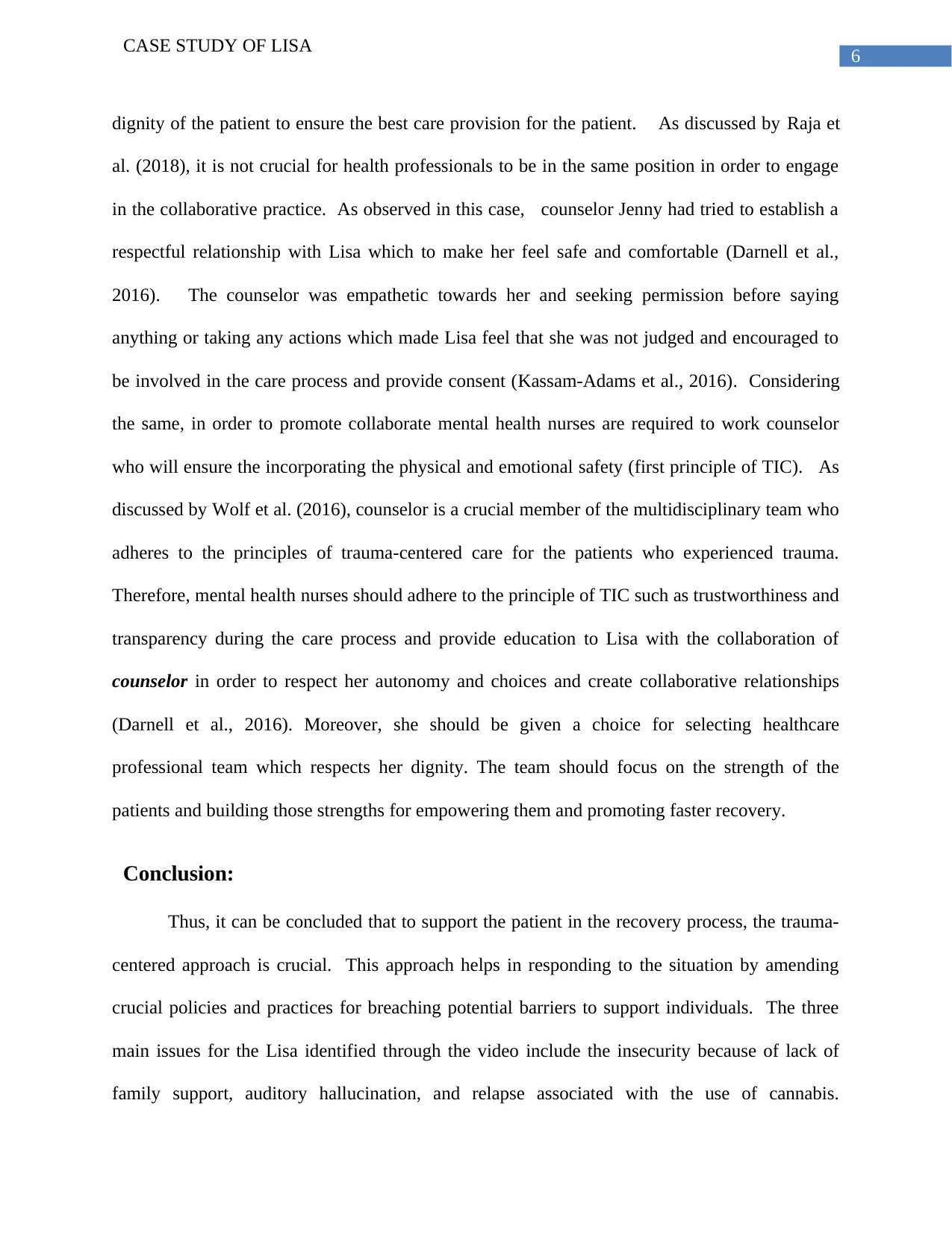
6
CASE STUDY OF LISA
dignity of the patient to ensure the best care provision for the patient. As discussed by Raja et
al. (2018), it is not crucial for health professionals to be in the same position in order to engage
in the collaborative practice. As observed in this case, counselor Jenny had tried to establish a
respectful relationship with Lisa which to make her feel safe and comfortable (Darnell et al.,
2016). The counselor was empathetic towards her and seeking permission before saying
anything or taking any actions which made Lisa feel that she was not judged and encouraged to
be involved in the care process and provide consent (Kassam-Adams et al., 2016). Considering
the same, in order to promote collaborate mental health nurses are required to work counselor
who will ensure the incorporating the physical and emotional safety (first principle of TIC). As
discussed by Wolf et al. (2016), counselor is a crucial member of the multidisciplinary team who
adheres to the principles of trauma-centered care for the patients who experienced trauma.
Therefore, mental health nurses should adhere to the principle of TIC such as trustworthiness and
transparency during the care process and provide education to Lisa with the collaboration of
counselor in order to respect her autonomy and choices and create collaborative relationships
(Darnell et al., 2016). Moreover, she should be given a choice for selecting healthcare
professional team which respects her dignity. The team should focus on the strength of the
patients and building those strengths for empowering them and promoting faster recovery.
Conclusion:
Thus, it can be concluded that to support the patient in the recovery process, the trauma-
centered approach is crucial. This approach helps in responding to the situation by amending
crucial policies and practices for breaching potential barriers to support individuals. The three
main issues for the Lisa identified through the video include the insecurity because of lack of
family support, auditory hallucination, and relapse associated with the use of cannabis.
CASE STUDY OF LISA
dignity of the patient to ensure the best care provision for the patient. As discussed by Raja et
al. (2018), it is not crucial for health professionals to be in the same position in order to engage
in the collaborative practice. As observed in this case, counselor Jenny had tried to establish a
respectful relationship with Lisa which to make her feel safe and comfortable (Darnell et al.,
2016). The counselor was empathetic towards her and seeking permission before saying
anything or taking any actions which made Lisa feel that she was not judged and encouraged to
be involved in the care process and provide consent (Kassam-Adams et al., 2016). Considering
the same, in order to promote collaborate mental health nurses are required to work counselor
who will ensure the incorporating the physical and emotional safety (first principle of TIC). As
discussed by Wolf et al. (2016), counselor is a crucial member of the multidisciplinary team who
adheres to the principles of trauma-centered care for the patients who experienced trauma.
Therefore, mental health nurses should adhere to the principle of TIC such as trustworthiness and
transparency during the care process and provide education to Lisa with the collaboration of
counselor in order to respect her autonomy and choices and create collaborative relationships
(Darnell et al., 2016). Moreover, she should be given a choice for selecting healthcare
professional team which respects her dignity. The team should focus on the strength of the
patients and building those strengths for empowering them and promoting faster recovery.
Conclusion:
Thus, it can be concluded that to support the patient in the recovery process, the trauma-
centered approach is crucial. This approach helps in responding to the situation by amending
crucial policies and practices for breaching potential barriers to support individuals. The three
main issues for the Lisa identified through the video include the insecurity because of lack of
family support, auditory hallucination, and relapse associated with the use of cannabis.
Paraphrase This Document
Need a fresh take? Get an instant paraphrase of this document with our AI Paraphraser

7
CASE STUDY OF LISA
Considering the principle of trauma-informed care, the incorporation of the family members
and boyfriend in the recovery for designing of the safety plan and movement plan is required to
promote wellbeing. In this case, mental health nurses can collaborate with a counselor to ensure
best practice.
CASE STUDY OF LISA
Considering the principle of trauma-informed care, the incorporation of the family members
and boyfriend in the recovery for designing of the safety plan and movement plan is required to
promote wellbeing. In this case, mental health nurses can collaborate with a counselor to ensure
best practice.
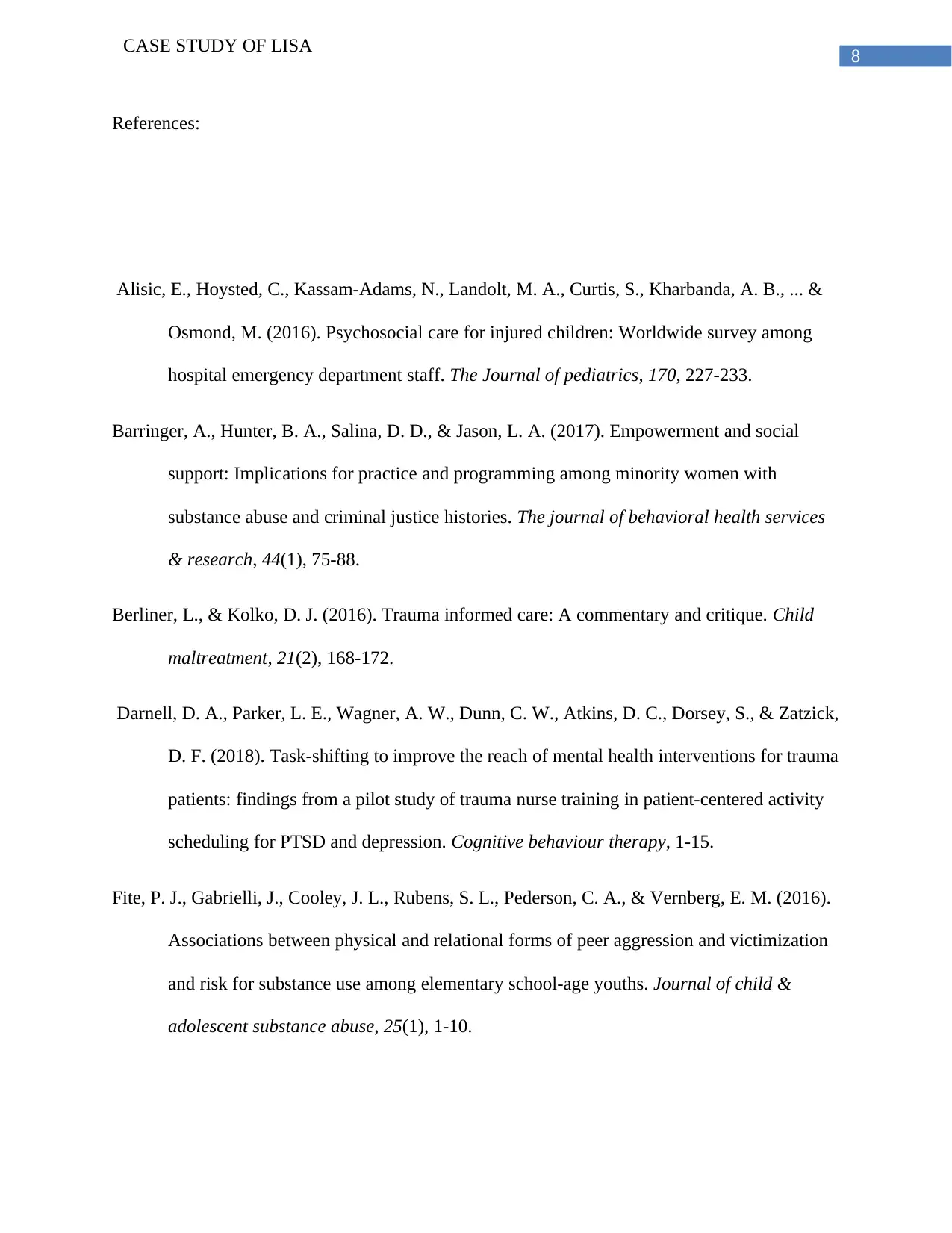
8
CASE STUDY OF LISA
References:
Alisic, E., Hoysted, C., Kassam-Adams, N., Landolt, M. A., Curtis, S., Kharbanda, A. B., ... &
Osmond, M. (2016). Psychosocial care for injured children: Worldwide survey among
hospital emergency department staff. The Journal of pediatrics, 170, 227-233.
Barringer, A., Hunter, B. A., Salina, D. D., & Jason, L. A. (2017). Empowerment and social
support: Implications for practice and programming among minority women with
substance abuse and criminal justice histories. The journal of behavioral health services
& research, 44(1), 75-88.
Berliner, L., & Kolko, D. J. (2016). Trauma informed care: A commentary and critique. Child
maltreatment, 21(2), 168-172.
Darnell, D. A., Parker, L. E., Wagner, A. W., Dunn, C. W., Atkins, D. C., Dorsey, S., & Zatzick,
D. F. (2018). Task-shifting to improve the reach of mental health interventions for trauma
patients: findings from a pilot study of trauma nurse training in patient-centered activity
scheduling for PTSD and depression. Cognitive behaviour therapy, 1-15.
Fite, P. J., Gabrielli, J., Cooley, J. L., Rubens, S. L., Pederson, C. A., & Vernberg, E. M. (2016).
Associations between physical and relational forms of peer aggression and victimization
and risk for substance use among elementary school-age youths. Journal of child &
adolescent substance abuse, 25(1), 1-10.
CASE STUDY OF LISA
References:
Alisic, E., Hoysted, C., Kassam-Adams, N., Landolt, M. A., Curtis, S., Kharbanda, A. B., ... &
Osmond, M. (2016). Psychosocial care for injured children: Worldwide survey among
hospital emergency department staff. The Journal of pediatrics, 170, 227-233.
Barringer, A., Hunter, B. A., Salina, D. D., & Jason, L. A. (2017). Empowerment and social
support: Implications for practice and programming among minority women with
substance abuse and criminal justice histories. The journal of behavioral health services
& research, 44(1), 75-88.
Berliner, L., & Kolko, D. J. (2016). Trauma informed care: A commentary and critique. Child
maltreatment, 21(2), 168-172.
Darnell, D. A., Parker, L. E., Wagner, A. W., Dunn, C. W., Atkins, D. C., Dorsey, S., & Zatzick,
D. F. (2018). Task-shifting to improve the reach of mental health interventions for trauma
patients: findings from a pilot study of trauma nurse training in patient-centered activity
scheduling for PTSD and depression. Cognitive behaviour therapy, 1-15.
Fite, P. J., Gabrielli, J., Cooley, J. L., Rubens, S. L., Pederson, C. A., & Vernberg, E. M. (2016).
Associations between physical and relational forms of peer aggression and victimization
and risk for substance use among elementary school-age youths. Journal of child &
adolescent substance abuse, 25(1), 1-10.
⊘ This is a preview!⊘
Do you want full access?
Subscribe today to unlock all pages.

Trusted by 1+ million students worldwide
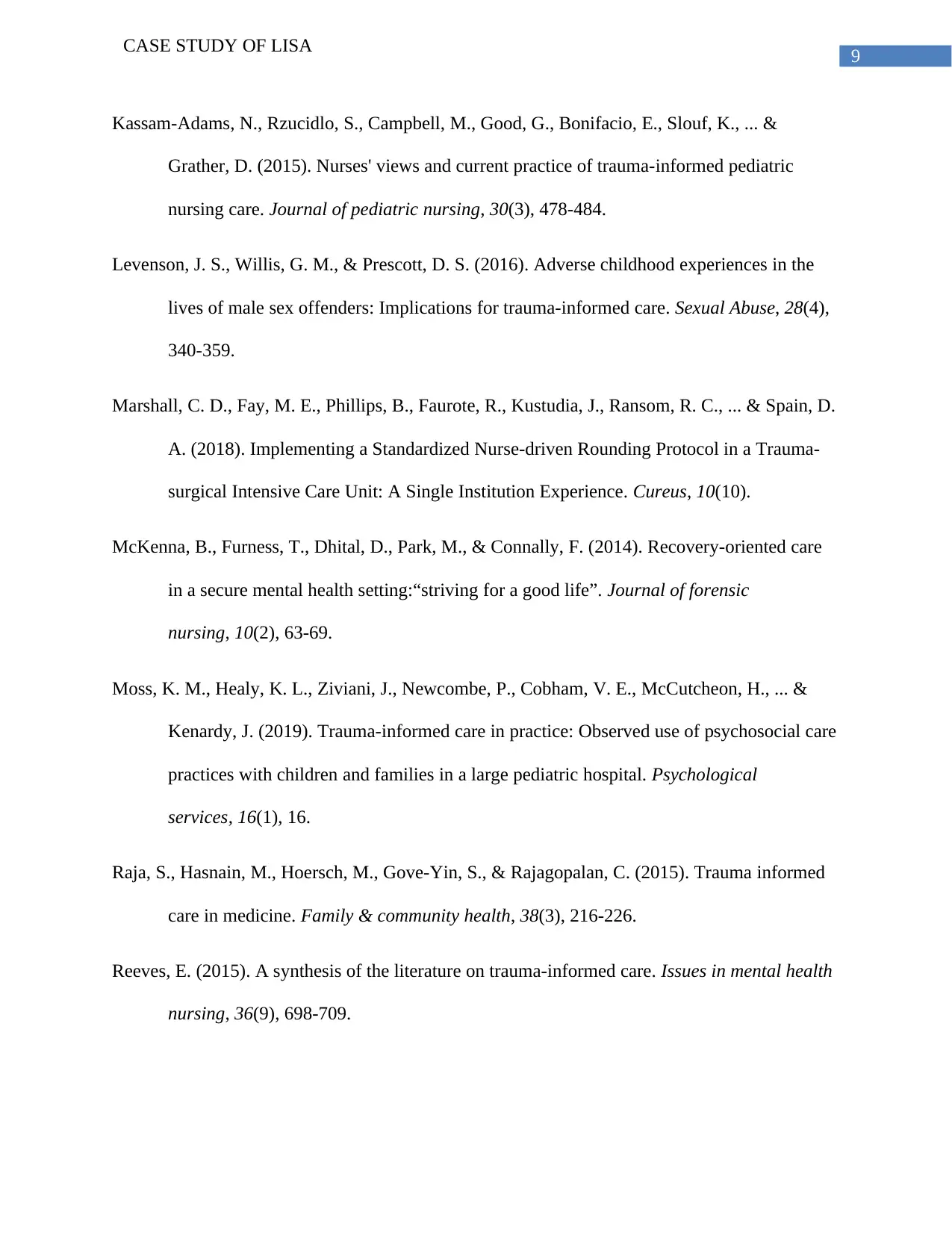
9
CASE STUDY OF LISA
Kassam-Adams, N., Rzucidlo, S., Campbell, M., Good, G., Bonifacio, E., Slouf, K., ... &
Grather, D. (2015). Nurses' views and current practice of trauma-informed pediatric
nursing care. Journal of pediatric nursing, 30(3), 478-484.
Levenson, J. S., Willis, G. M., & Prescott, D. S. (2016). Adverse childhood experiences in the
lives of male sex offenders: Implications for trauma-informed care. Sexual Abuse, 28(4),
340-359.
Marshall, C. D., Fay, M. E., Phillips, B., Faurote, R., Kustudia, J., Ransom, R. C., ... & Spain, D.
A. (2018). Implementing a Standardized Nurse-driven Rounding Protocol in a Trauma-
surgical Intensive Care Unit: A Single Institution Experience. Cureus, 10(10).
McKenna, B., Furness, T., Dhital, D., Park, M., & Connally, F. (2014). Recovery-oriented care
in a secure mental health setting:“striving for a good life”. Journal of forensic
nursing, 10(2), 63-69.
Moss, K. M., Healy, K. L., Ziviani, J., Newcombe, P., Cobham, V. E., McCutcheon, H., ... &
Kenardy, J. (2019). Trauma-informed care in practice: Observed use of psychosocial care
practices with children and families in a large pediatric hospital. Psychological
services, 16(1), 16.
Raja, S., Hasnain, M., Hoersch, M., Gove-Yin, S., & Rajagopalan, C. (2015). Trauma informed
care in medicine. Family & community health, 38(3), 216-226.
Reeves, E. (2015). A synthesis of the literature on trauma-informed care. Issues in mental health
nursing, 36(9), 698-709.
CASE STUDY OF LISA
Kassam-Adams, N., Rzucidlo, S., Campbell, M., Good, G., Bonifacio, E., Slouf, K., ... &
Grather, D. (2015). Nurses' views and current practice of trauma-informed pediatric
nursing care. Journal of pediatric nursing, 30(3), 478-484.
Levenson, J. S., Willis, G. M., & Prescott, D. S. (2016). Adverse childhood experiences in the
lives of male sex offenders: Implications for trauma-informed care. Sexual Abuse, 28(4),
340-359.
Marshall, C. D., Fay, M. E., Phillips, B., Faurote, R., Kustudia, J., Ransom, R. C., ... & Spain, D.
A. (2018). Implementing a Standardized Nurse-driven Rounding Protocol in a Trauma-
surgical Intensive Care Unit: A Single Institution Experience. Cureus, 10(10).
McKenna, B., Furness, T., Dhital, D., Park, M., & Connally, F. (2014). Recovery-oriented care
in a secure mental health setting:“striving for a good life”. Journal of forensic
nursing, 10(2), 63-69.
Moss, K. M., Healy, K. L., Ziviani, J., Newcombe, P., Cobham, V. E., McCutcheon, H., ... &
Kenardy, J. (2019). Trauma-informed care in practice: Observed use of psychosocial care
practices with children and families in a large pediatric hospital. Psychological
services, 16(1), 16.
Raja, S., Hasnain, M., Hoersch, M., Gove-Yin, S., & Rajagopalan, C. (2015). Trauma informed
care in medicine. Family & community health, 38(3), 216-226.
Reeves, E. (2015). A synthesis of the literature on trauma-informed care. Issues in mental health
nursing, 36(9), 698-709.
Paraphrase This Document
Need a fresh take? Get an instant paraphrase of this document with our AI Paraphraser
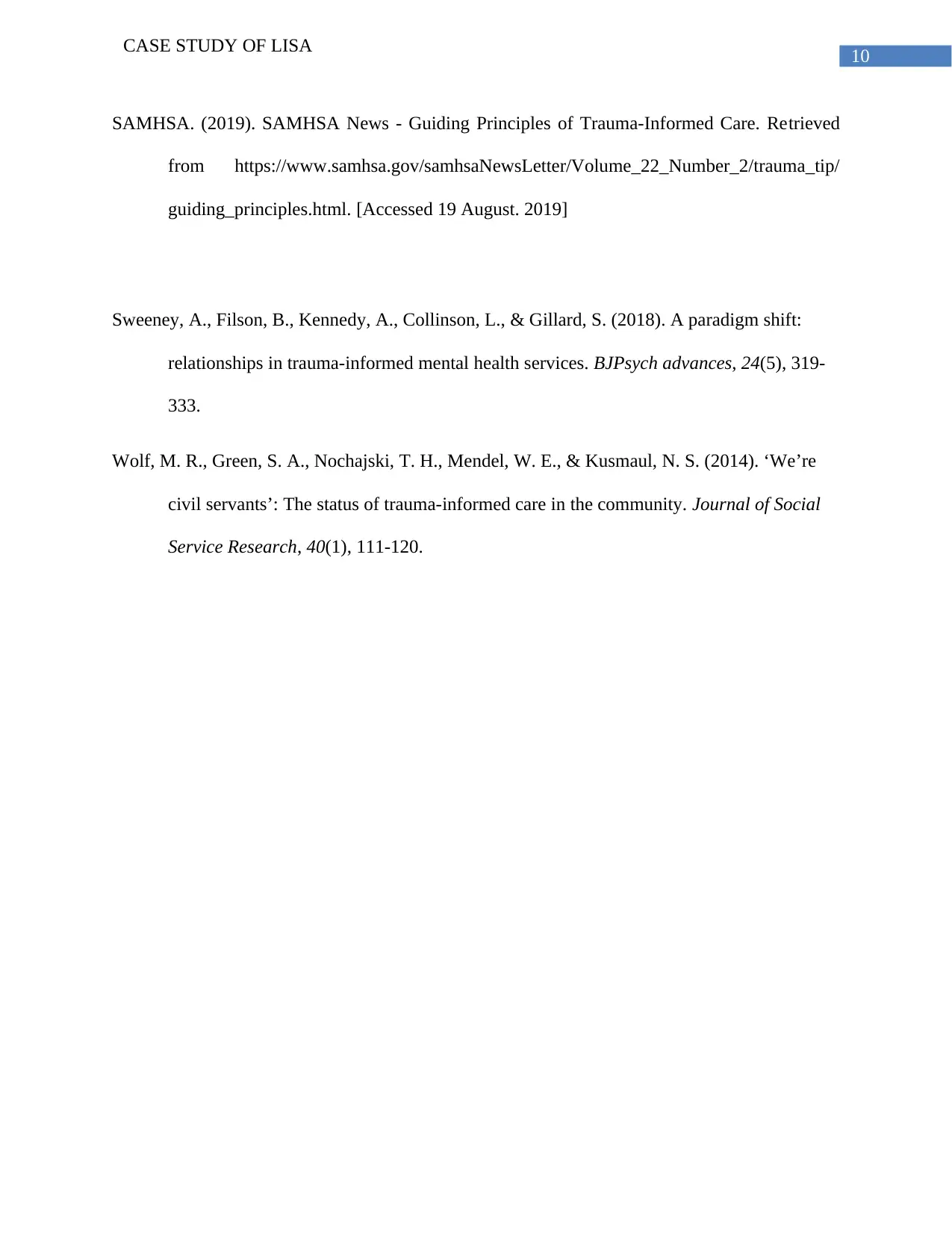
10
CASE STUDY OF LISA
SAMHSA. (2019). SAMHSA News - Guiding Principles of Trauma-Informed Care. Retrieved
from https://www.samhsa.gov/samhsaNewsLetter/Volume_22_Number_2/trauma_tip/
guiding_principles.html. [Accessed 19 August. 2019]
Sweeney, A., Filson, B., Kennedy, A., Collinson, L., & Gillard, S. (2018). A paradigm shift:
relationships in trauma-informed mental health services. BJPsych advances, 24(5), 319-
333.
Wolf, M. R., Green, S. A., Nochajski, T. H., Mendel, W. E., & Kusmaul, N. S. (2014). ‘We’re
civil servants’: The status of trauma-informed care in the community. Journal of Social
Service Research, 40(1), 111-120.
CASE STUDY OF LISA
SAMHSA. (2019). SAMHSA News - Guiding Principles of Trauma-Informed Care. Retrieved
from https://www.samhsa.gov/samhsaNewsLetter/Volume_22_Number_2/trauma_tip/
guiding_principles.html. [Accessed 19 August. 2019]
Sweeney, A., Filson, B., Kennedy, A., Collinson, L., & Gillard, S. (2018). A paradigm shift:
relationships in trauma-informed mental health services. BJPsych advances, 24(5), 319-
333.
Wolf, M. R., Green, S. A., Nochajski, T. H., Mendel, W. E., & Kusmaul, N. S. (2014). ‘We’re
civil servants’: The status of trauma-informed care in the community. Journal of Social
Service Research, 40(1), 111-120.
1 out of 11
Related Documents
Your All-in-One AI-Powered Toolkit for Academic Success.
+13062052269
info@desklib.com
Available 24*7 on WhatsApp / Email
![[object Object]](/_next/static/media/star-bottom.7253800d.svg)
Unlock your academic potential
Copyright © 2020–2026 A2Z Services. All Rights Reserved. Developed and managed by ZUCOL.





